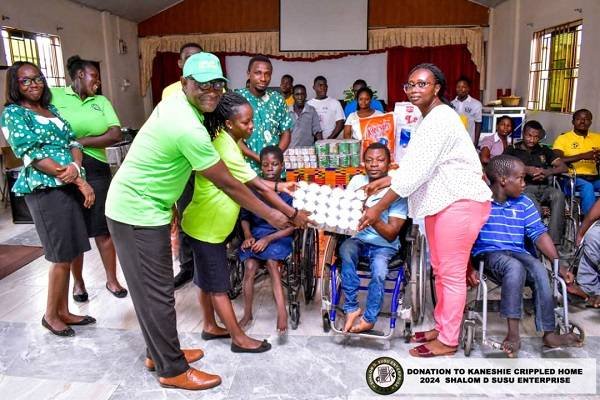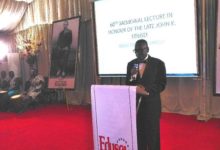
A microfinance company, Shalom D Susu Enterprise, has presented cash and assorted items to the Ghana Society for the Socially Disadvantaged formerly known as the Kaneshie Cripples Home.
The donation forms part of its corporate social responsibility to support and improve the living conditions of person’s living with disability in the home.
The home provides free residential-vocational training to person’s living with disability and has over the years been largely dependent on support from the public.
In addition to the undisclosed amount of money, Shalom D Susu Enterprise presented food items such as bags of rice, canned fish, cooking oil, tins of milk, boxes of oat and tins of cocoa beverage.
It also included bottled-water, sachet water, toiletries and washing powder.
Presenting the items, the founder of Shalom D Susu Enterprise, Rev. Peter Dodoo, said the company, which had been in existence for more than 30 years, was dedicated to providing a credible platform for the economically neglected to save money and build capital for their economic empowerment.
He further said the company had in the process helped thousands to elevate themselves from poverty.
“As a company we believe that when you make profit it has to be shared with, especially the less privileged in society and we have decided to do this every year as our social responsibility,” he outlined.
The Centre Manageress, Ms Evelyn Ampadu, expressed gratitude to Shalom D Enterprise for supporting the home, adding that the donation would go a long way to improve the living conditions of the beneficiaries.
She also said the home was established in 1958 by the Department of Social Welfare and the Ministry of Health in order to enhance the quality of life for persons living with disabilities and the socially-disadvantaged youth by providing them with free residential-vocational training.
She again stated that currently there were 34 beneficiaries who were receiving training in dressmaking, tailoring, shoemaking and beads making in which they aimed at helping them to be independent, self-sufficient and contribute to national development.
Persons who complete the three-year training programme, she noted, received start-up tools and equipment such as sewing machines and materials for the train and skills they acquire in order to enable them start work on their own.
They also received clutches, wheelchairs, and guidance and counseling services.
Moreover, she said the programme was opened to all less-privileged between 15 to 40 years.
Ms Ampadu appealed for support from more donors to help train more persons.
The appeal included requests for funds for utility bills, refurbishment of the boys’ dormitory, and painting of the facility to provide a better living environment for the beneficiaries.
BY AGNES OPOKU SARPONG







